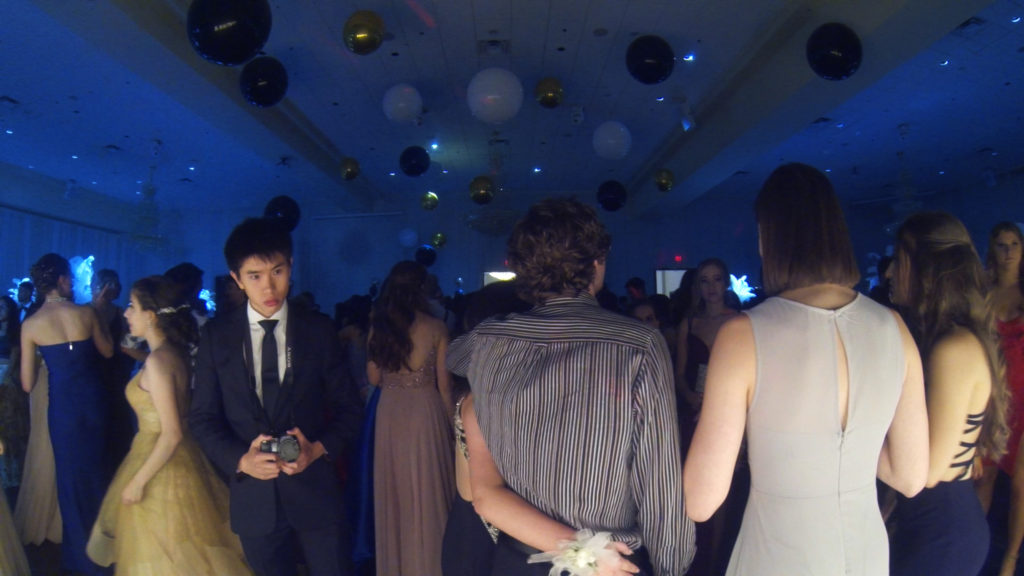Reviews include Irena’s Vow, The Beast, and Before I Change My Mind.
Slamdance Rolls Out the Next Wave of Canadian Talent
February 10, 2022

By Mark Hanson
It’s no secret that the Sundance Film Festival has increasingly become a launching pad for glitzy celebrity-fronted films that arrive with lucrative distribution deals and prospective awards campaigns already in place. It’s therefore fallen upon Park City’s neighbouring Slamdance Film Festival to pick up the mantle of being a premier venue for truly independent cinematic stories, showcasing a broad range of DIY work made on budgets not exceeding a million bucks—really, embodying the spirit with which Sundance originated. Since its inception in 1995, Slamdance, which takes place during the week immediately following Sundance, has grown into a force to be reckoned with on the North American film festival scene. And while it has even amassed some celebrity cachet of its own – Christopher Nolan, whose debut feature, Following, played the fest in 1999, was welcomed back for a talk in 2014 – it has done so without compromising any of its artistic integrity.
Within the last decade, Slamdance has also developed a reputation for launching exciting new Canadian fare. The festival increasingly screens work from up-and-coming filmmakers who often face a myriad of struggles to get seen by audiences outside (or even inside) of the Great White North. Films such as Matt Johnson’s The Dirties, Pavan Moondi and Brian Robertson’s Diamond Tongues and Heather Young’s Murmur have all played, and sometimes won top awards, at the fest, kicking open the door for further exposure. Slamdance sometimes connects homegrown talent with prominent US industry personalities. That was the case with The Dirties, which indie film legend Kevin Smith (Clerks) enthusiastically championed and ultimately helped distribute after seeing it at the fest.
The 2022 edition of Slamdance was no exception, featuring the world premieres of three Canadian films – Adrian Murray’s Retrograde, Ethan Eng’s Therapy Dogs, and Avalon Fast’s Honeycomb – all of which display an eclectic and boundless creativity that indicates a bright future for our film culture. And with Slamdance electing to go virtual for the second year in a row due to pandemic concerns, the resulting attention is potentially even greater, as viewers all over the world were able to tune in to the festival’s offerings.
Adrian Murray, for one, is no stranger to Slamdance. His debut feature, Withdrawn, made its premiere at the fest in 2017, among a particularly robust array of Canadian breakouts that included Joyce Wong’s Wexford Plaza, Jordan Canning’s Suck It Up and Daniel Warth’s Grand Jury Prize-winning Dim the Fluorescents. But while those three films returned home to warm local reception and theatrical runs through Toronto-based distributor levelFILM, Withdrawn became somewhat lost in the mix. But Murray’s bleakly humorous take on the stressful living conditions of today’s twentysomethings, concerning a story about a strapped-for-cash young man who dips his toes into the world of credit card fraud, has only become more relevant in the years since.

Murray continues to probe the terrain of post-collegiate anxiety in Retrograde, which details the odyssey that a young woman named Molly (Molly Reisman) embarks on to overturn the minor traffic citation she received for an incident of alleged dangerous driving. Convinced that the cop who pulled her over is the one at fault, Molly refuses to pay the relatively pithy fine, instead choosing to set up inconvenient meeting after inconvenient meeting in order to have justice served. As this quest turns into a full-on neurosis, Molly begins to accordingly crack, affecting her performance at her mundane office job and alienating the friends whom she believes aren’t taking the matter seriously. To make matters worse, her roommate, Gabrielle (Sofia Banzhaf), who was in the passenger seat at the time, refuses to act as a witness and changes her tune on what she actually saw. Since we don’t see the extent of the incident ourselves (the film begins with Molly already having been pulled over), the whole basis of Molly’s dispute comes into question.
Murray lends this situation a subtly gripping immediacy, while keeping a sense of absurdity in check by contrasting how bent out of shape Molly gets with everyone else’s utter nonchalance over the situation, including the lawyer she eventually consults. Using the same coolly detached static-shot aesthetic of Withdrawn, Murray tellingly depicts the Kafkaesque nature of the government and legal systems that Molly becomes mired in. It brings to mind the sly approach of a Romanian New Wave staple like Police, Adjective, in which Corneliu Porumboiu wryly satirized the disconnect between the personal and the procedural. With Reisman perfectly conveying her character’s internal meltdown and stubborn refusal to take any sort of responsibility, Retrograde astutely reckons with Molly’s dawning realization that the world no longer seems to revolve around her.
Therapy Dogs, meanwhile, deals with similar themes but in a much different aesthetic fashion. Its chaotic found-footage conceit emerges as the antithesis to Retrograde’s hyper-controlled camerawork. Ethan Eng’s debut also has its roots in Slamdance history, as The Dirties’ creative duo of Matt Johnson and Matthew Mitchell serve as executive producers. Indeed, Therapy Dogs initially has a lot in common with The Dirties: namely, the video diary format, the focus on the shifting relationship between two close friends, an indistinct undertone of doom, and the gutsy tactic of shooting surreptitiously at an actual high school with real students as unwitting participants.
But unlike Johnson and company, Eng and co-star/co-writer Justin Morrice were actual students who claimed to be making a simple yearbook video for their senior class at Cawthra Park Secondary School in Mississauga. Where The Dirties was ultimately based around a contrived narrative trajectory, the let’s-see-what-happens methodology of Therapy Dogs resonates on a far more primal level. Playing thinly veiled versions of themselves, Eng and Morrice chart the aimlessness of the teen experience with refreshing authenticity, particularly as the film moves off school property to document rambunctious weekend parties and an assortment of delirious time-wasting activities.
Free of the pesky constraints of conventional storytelling, Therapy Dogs dares to present a free-flowing and unfiltered view of adolescence, with all of the short attention spans, drinking, smoking, coarse language, physical fighting, and stunt behaviour that goes along with it. One particular moment of jaw-dropping amateur daredevilry consists of Justin strapping himself to the hood of a car while his friend proceeds to drive donuts around a parking lot – a Jackass-lite stunt that results in the arrival of real police officers on the scene. When the film suddenly adopts a more somber tone for its final act, amidst Ethan’s subtly creeping bouts of depression, the emotional gut punch hits even harder considering how effectively Eng and Morrice portray teens who mask their pain through youthful hedonism—and how the dishevelled anarchy of the filmmaking style becomes a channel to make sense of their boundless juvenile confusion.

Honeycomb begins as a similarly realistic portrait of youth, revolving around a group of five girls killing time during the hot summer months after graduation in their forest-enshrouded British Columbia town. Crafted by director Avalon Fast in collaboration with friends and peers, the film at first appears to be in conjunction with any number of slacker youth dramas concerning the trepidation of transitioning into adulthood. When the tedium of hanging out with local guys and working mundane jobs gets too much to bear, the girls decide to venture out into the woods and live in an abandoned cabin that one of them previously stumbled upon. From here, the strange horror-inflected tale that ensues feels like it’s been beamed onto the screen from another planet.
“Honeycomb is a way of feeling,” is how the Slamdance synopsis describes Fast’s film, and that’s really the best summary for a cinematic head-trip that eludes lucid explanation. The film only continues to increase in obliqueness as the girls search for a new way of existing in the wilderness, free from meaningless social constraints. But what starts out as a cool hangout spot where they sporadically invite other friends to come and party turns diabolical as the girls’ environment begins to slowly deteriorate their mental states, leading to a powerful aura of ennui and eventual eruptions of violence.
Honeycomb has a purposefully lo-fi look but certainly not in a way that betrays any kind of amateurish quality. Instead, it adds to the dreamlike home video vibe, suggesting some kind of hellish fusion of The Virgin Suicides and The Blair Witch Project. Even that facile comparison doesn’t do the film justice, however, as Fast is clearly working with heady ideas sprouting from the loss of innocence throughout while affording her enigmatic characters poetic monologues that have us hanging off their every cryptic word. As the credits roll on this thrilling experiment and bridge to a series of charming outtakes that observe the sheer joy of making art with friends, you’ll be hard-pressed not to ruminate on Honeycomb’s tantalizing mysteries for days after.
More than most of today’s pre-eminent festivals, Slamdance largely favours younger viewpoints in its lineup. These three films vitally depict a late-millennial/Gen-Z cohort, reared on a rapidly shifting cultural landscape and the continued democratization of filmmaking practices, grappling with entering a world that is only becoming more fractious by the day. While varying in their individual tones and narrative constructions, the characters in all of these films end up dealing with their uncertain destinies by enacting a kind of psychological retreat – whether into their own singular perspectives, dream worlds, or the camera itself – all in the desperate hope of creating a better path forward. In imaginatively exploring these urgent interior dilemmas, the next wave of Canadian filmmaking talent has undoubtedly forged a bright future. And Slamdance, as always, has its finger squarely on the pulse.
Mark Hanson is a 2021 winner for the TFCA’s Cineplex Emerging Critic Award.



